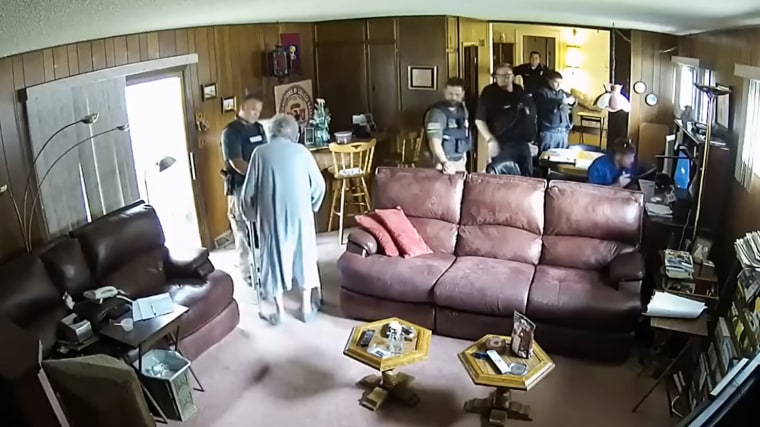
Former Marion Police Chief Gideon Cody could face a felony or a misdemeanor obstruction of justice charge linked to the Aug. 11, 2023, raid of the Marion County Record.
Get more news Live Aug. 5, 2024, 7:57 PM UTC By Austin Mullen , Antonio Planas and The Associated PressTwo special prosecutors said Monday they will file a criminal obstruction of justice charge against a former Kansas police chief who directed warrant searches of a publisher and his newsroom over its retrieval of public information.

In a 124-page report summarizing the findings of their investigation, the special prosecutors, Sedgwick County District Attorney Marc Bennett and Riley County Attorney Barry Wilkerson, indicate that the staff of the newspaper that was raided, the Marion County Record, committed no crimes.
As of Monday, prosecutors hadn't filed any criminal charges against former Marion Police Chief Gideon Cody. It was not immediately clear if they would be seeking a felony or misdemeanor charge against Cody. The special prosecutors are working with the Colorado Bureau of Investigation, which stepped in at the request of the Kansas Bureau of Investigation.
“The findings will be incorporated into charges which will be sought in Marion County District Court,” the report said.
Cody did not return a voicemail seeking comment from NBC News. Cody, a former Kansas City police officer, resigned from the Marion Police Department less than two months after the Aug. 11, 2023, raid.
Marion Mayor David Mayfield suspended Cody prior to his resignation.
Cody used his five-member force and help from Marion County sheriff’s deputies to launch warrant-based searches of the newspaper's newsroom, as well as the homes of its publisher, Eric Meyer, and of City Council member Ruth Herbel.
The report suggested that Marion police, who were led at the time by Cody, conducted a poor investigation that led them to “reach erroneous conclusions” that Meyer and reporter Phyllis Zorn had committed identity theft or other computer crimes when it accessed driving records for local restaurateur Kari Newell.
The newspaper said it received a tip that Newell was convicted of a DUI in 2008 and that Zorn used the state Revenue Department's online search engine to obtain the records. The publication was looking into whether that would have prevented Newell from having a liquor license. The newspaper said it also asked police about the tip.
Herbel received the same tip.
Bennett and Wilkerson concluded that neither Meyer nor Zorn committed any crimes in verifying information in the business owner’s driving record through a database available online from the state.
The newsroom raid sparked a national outcry and dialogue about the freedom of the press.
Marion, a town of less than 2,000 residents, is about 150 miles southwest of Kansas City.
A day after police raided Meyer’s home, his 98-year-old mother, Record co-owner Joan Meyer, died. He blamed her death on stress caused by the raids. The report acknowledged that Joan Meyer was extremely upset by the searches and may not have died if the raids had not been carried out. But the prosecutors concluded that the officers were not criminally responsible for her death.
Reached by phone Monday morning, Meyer said it was too early for him to react because he was still reading the report.
The prosecutors concluded that they had probable cause to believe that Cody obstructed an official judicial process. They said two pages of a written statement made by the Newell following the raid were not submitted to investigators with the rest of the statement in September, about six weeks after the raid.
The report also makes a passing reference to text messages between Cody and the business owner after the raid. The business owner has said that Cody asked her to delete text messages between them, fearing people could get wrong ideas about their relationship, which she said was professional and platonic.
A felony obstruction charge could be punished by up to nine months in prison for a first-time offender, though the typical sentence would be 18 months or less on probation. A misdemeanor charge could result in up to a year in jail.
Austin MullenAntonio Planas is a breaking news reporter for NBC News Digital.